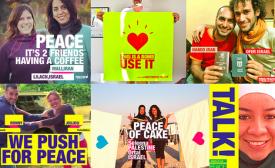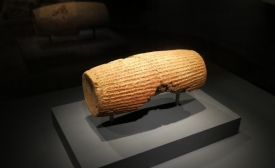Cultural Diplomacy
North Korea has its own version of the iPad—it's called the Samjiyon. Internet access is tightly controlled by the human-rights-allergic regime, so the device is merely another conduit for state propaganda. It comes pre-loaded with games, a multi-language dictionary, and an interesting collection of eBooks in the "foreign literature" section.
Twenty-three sake masters held a tasting event at U.N. headquarters Friday, giving diplomats and their staff a chance to sample various kinds the Japanese liquor often called rice wine. While sampling sakes made by 48 breweries across Japan, some hailed the “sophistication and craftsmanship” used to create the intriguing tastes.
A KFC franchise sits on Cairo's iconic Tahrir Square, the site of nearly three years of demonstrations that have helped unseat two Egyptian presidents. But in a country rife with conspiracy theories, the Colonel hasn't been able to keep away from controversy during the constant protests. In early 2011, as demonstrators called for then-Egyptian President Hosni Mubarak's resignation, rumors trying to paint them as Western puppets said they were being compensated for their fervor with KFC meals. The Los Angeles Times has the lowdown.

This week at CPD, we hosted Dr. Timothy Potts, the director of the J. Paul Getty Museum, who discussed the Cyrus Cylinder as a cultural icon and museums as vehicles for promoting global dialogue.
Art from the Democratic People’s Republic of Korea is a trademark for contemporary socialist realism. You can actually purchase DPRK art online—everything from propaganda posters to lucid landscapes, flower bouquets, and even family portraits. Sure, the propaganda posters sell best (they’re also the cheapest), but the jewel paintings are another thing entirely (rare and glitzy, completely made of stones).

The Cyrus Cylinder, a 2,500-year-old object discovered in ancient Babylon, is considered by many to be the first declaration of human rights. This unique artifact, part of the British Museum collection, continues to excite the imagination of different peoples from around the world.
On October 6, 2013, 16 women from Argentina, Brazil, Bulgaria, Egypt, Kenya, Mexico, Nigeria, Pakistan, Papua New Guinea, Peru, Poland, South Africa, Taiwan, Turkmenistan and Uganda gathered to share stories about their time in the United States. These women may have come from all corners of the globe and speak different languages, but one trait unifies them: They all want to create more opportunities for women and girls through sports.







